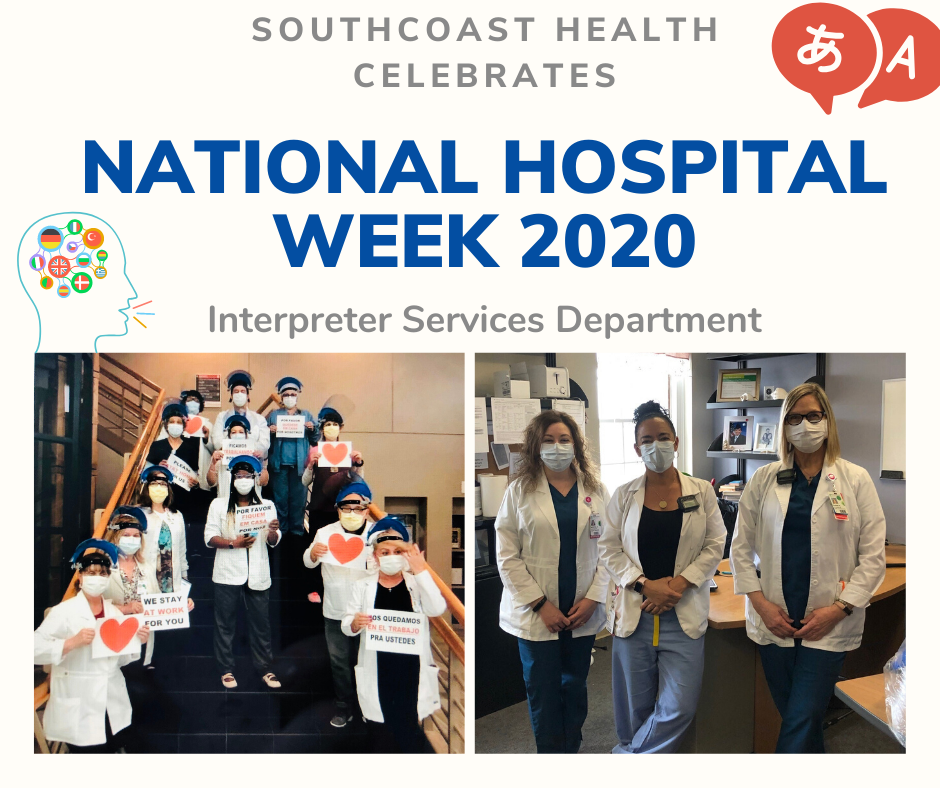Staff Profiles
National Hospital Week – Honoring Our Interpreter Services Department

National Hospital Week recognizes the compassion, care and assistance provided by hospitals across the country. In turn, Southcoast Health appreciates the dedication, duty, and kindness that our entire staff extends to patients and the community.
Our staff provides a wide range of services, from emergency care, minor surgery, health maintenance, and even access to interpreter services. The individuals and teams that shape Southcoast Health fulfill an essential need in our community.
Imagine being ill in the hospital and no one can understand what you’re saying, and you can’t understand them either because you don’t speak their language, and they don’t speak yours. Additionally, visitors are limited because of COVID-19 and so you’re alone. Fortunately, at Southcoast, patients aren’t experiencing this difficulty, by and large.
Our 28-member Interpreter Services team (which includes per diem staff) works around the clock serving patients whose first language is other than English. The department provides medical interpreting services in Spanish, Portuguese, Cambodian, Cape Verdean Creole and sign language. The Interpreter Services Department is 24/7 in ensuring that the needs of the system and the patients are met. They serve Charlton Memorial, St. Luke’s, Tobey, Radiation Oncology and our Rehabilitation Centers with skill and compassion.
“The Interpreter Services team has been phenomenal during this pandemic,” says Kimberley Coon, Executive Director of Hospital & Medical Staff Services. “They’re here every day without fail; they gown and mask every morning, translate in the Emergency Department, assist at patient bedsides, and do whatever is needed to get the job done.”
“Our certified medical interpreters are highly respected, a true part of the care team. They provide an essential service,” adds Margaret Furtado, Team Lead, Interpreter Services. “They know risks. And it hasn’t diminished their commitment to patients at all.”
Most of their work is done in-person, face to face with patients. Some interpreting is done through telehealth and over the phone. They never know who they’ll be called up to translate for and what their situation may be. They are prepared to serve most anyone who comes through our doors and in any situation or circumstance.
The interpreter staff finds that patients have varying English-speaking ability. “Some people understand English, but they can’t speak it. Others understand a lot, but can’t understand the medical terms,” says Karin Ruoff, Medical Interpreter.
As Sueli Tabares, Medical Interpreter says, “Our job is to communicate between the provider and patient. And that communication has to be accurate.” They make the doctor’s job, the nurse’s job, the job of any clinical staff person, not just easier, but more effective.
“For non-English speaking patients and their healthcare providers, medical interpreters provide an invaluable service, especially in navigating varied dialects and communication styles,” says Dr. Dani Hackner, Chief Clinical Officer of Southcoast. “They are absolutely essential team members.”
As important as their skills are in interpreting, our certified medical interpreters are providing another critical service during the COVID-19 pandemic that should not be overlooked. They are an emotional haven for patients who are frightened and alone because of their illness and difficulty with the English language.
“You feel for them. They are here alone,” says Bertha Reis, Medical Interpreter. “It’s nice to see how grateful patients are when they see a face that speaks their language.”
One recent patient told Bertha, “This is very sad. I’m here all alone.”
“They trust us. They feel like we’re part of their family,” says Bertha.
Dulce Rock, Medical Interpreter, had to tell a wife that her partner passed away. She was in “a state of shock.” It was “heart-wrenching,” she says. “One of those most difficult things I’ve ever had to do. Because of COVID-19, we can’t have physical contact with people. Can’t give them a hug. I could at least convey compassion and sympathy.”
Despite the challenges and stress of working in a COVID-19 environment, our medical interpreters find a great deal of satisfaction in their work.
Tatiana Da Graca, Medical Interpreter, who has been an interpreter at St. Luke’s for five years, says, “I love my job, love what I do. I’m grateful to be working for Southcoast.” And then adds, with assurance, “Every interpreter would say that.”
And those of us at Southcoast can say with equal assurance; we are grateful for them.
